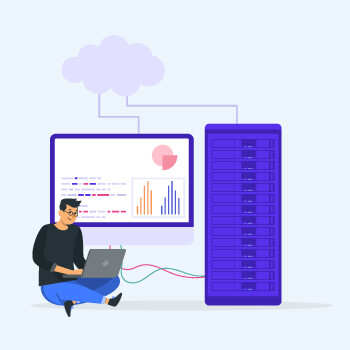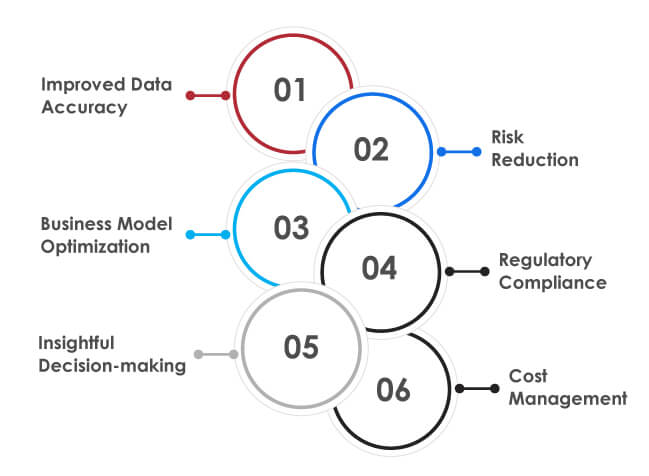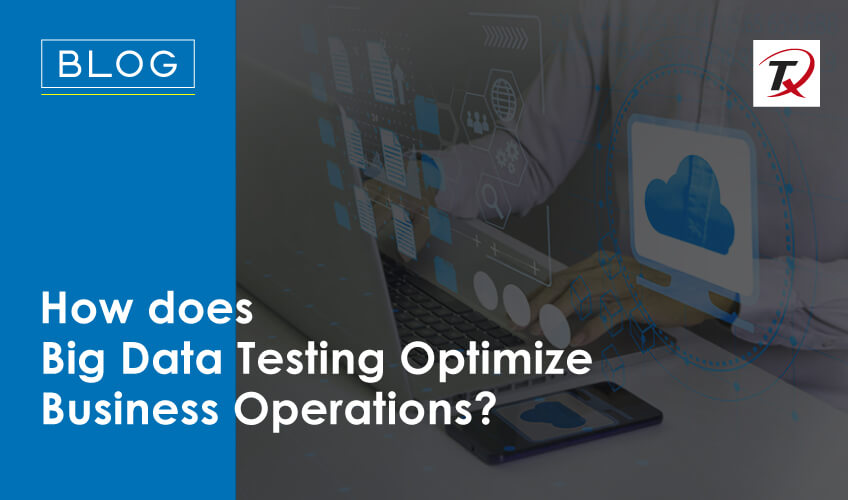Table of Contents
- What is Big Data Testing?
- Why is Big Data Testing Important?
- Challenges in Big Data Testing
- Impact of Big Data Testing on Business Decision-making
- Summary
- Why Choose Tx for Big Data Testing?
Data is one of businesses’ most valuable assets, and it’s practically impossible for them to remain profitable and competitive without proper data analysis methods. Big data testing is the center of connecting data with business assets, an indispensable practice for businesses that want to leverage a vast ocean of data. In 2023 alone, the big data analytics market was $307.53 billion, projected to reach $745.15 billion by 2030. Around 97% of organizations worldwide also focus on big data and AI, as these technologies are crucial to their processes and growth.
Despite this, around 73% of data goes unused for analytics, which signifies big data in resource utilization. Poor data quality costs the United States around $3.1 trillion annually, clearly stating the need for refined data handling and analysis. Big data is vast and complex, and the process of being a data-driven organization is filled with challenges like technical constraints, budget issues, and being uncomfortable with cultural shifts. To handle all of such issues, big data testing can enable businesses to handle the complexities of data-driven decision-making. By using testing and analysis, organizations can upgrade to new levels of efficiency, customer insights, and competitiveness.
What is Big Data Testing?

Before starting with big data testing, let us understand big data. It refers to the large collection of data sets (structured and unstructured) collected from multiple sources. It’s difficult to process these data sets manually, so businesses require multiple databases and tools to assist with the evaluation process. Over the last decade, the volume of data has grown exponentially because of data-driven and intelligent tools like IoT devices and AI systems. Experts say that we create around 2.5 quintillion bytes of data daily. One requires a robust big data testing solution to manage and ensure the data’s security, quality, and relevancy.
Big data testing focuses on verifying the integrity and quality of big data before businesses use it for decision-making. This is important because big data consists of large volumes from multiple sources and in varying formats. Big data testing ensures the data is reliable, complete, and accurate. One of its key aspects is data processing validation, which involves checking data once it is collected and processed accurately. As processing data volumes is complex and difficult, testing ensures that the processing algorithms work in sync to generate data output as expected.
Another important aspect is performance testing to check whether big data applications are processing large data volumes efficiently and quickly. This ensures the systems can handle data load and perform efficiently under varying conditions. It involves testing the systems’ scalability and speed. Data quality and security testing are also significant in big data testing. Data quality involves checking data consistency, reliability, and accuracy. As data quality issues negatively impact business decisions, identifying and correcting data inaccuracies becomes crucial. Also, because of processing vast amounts of sensitive information, it is important to ensure the security of big data systems. Security testing ensures proper data encryption, access controls, and compliance with data protection regulations.
Why is Big Data Testing Important?

Big data testing is critical for business success in the digital business environment, where data decides decisions. It is necessary to ensure data security, reliability, and quality, refining it into a trustworthy asset for decision-making. Businesses heavily rely on data insights for growth and seamless operations, and big data testing helps maintain the integrity and value of the information used. Following are some of the factors that show why big data testing is important for businesses:
• To ensure data accuracy for reliable business decisions.
• Ensure data consistency and validity from multiple sources.
• Maintaining efficient data processing and scalability.
• Protect sensitive data and ensure compliance with data protection laws.
• Enable businesses to adhere to data regulations and avoid legal issues.
• Facilitate informed and data-driven business strategies.
• Prevent costly errors and enhance operational efficiencies.
• Better understanding and service of customer requirements.
• Gain a competitive edge through data-driven insights.
Challenges in Big Data Testing

In the domain of big data, where data volume, velocity, variety, and veracity reach unprecedented levels, testing presents distinct and formidable hurdles. Effectively addressing these challenges is crucial to guarantee the dependability, precision, and efficiency of big data systems. Let’s explore the nuances of big data testing and uncover the obstacles that testers confront in this dynamic environment.
Data Volume Overload:
Big Data systems deal with massive volumes of data, often spanning terabytes or even petabytes. Testing such colossal datasets requires specialized tools, infrastructure, and strategies to simulate real-world scenarios effectively.
Data Variety Complexity:
Big Data encompasses diverse data types, including structured, semi-structured, and unstructured data from various sources such as social media, IoT devices, and sensor networks. Testing the integration, transformation, and processing of this heterogeneous data poses significant challenges.
Data Velocity Dynamics:
The speed at which data flows into big data systems, known as velocity, can be staggering. Testing real-time data ingestion, streaming analytics, and near-instantaneous processing capabilities requires advanced testing methodologies and tools capable of handling high-speed data streams.
Data Veracity Ambiguity:
Veracity refers to the accuracy, reliability, and trustworthiness of data. Big Data often grapples with data inconsistencies, errors, and uncertainties, stemming from disparate sources and data quality issues. Testing the veracity of data involves detecting and mitigating anomalies, ensuring data integrity and reliability.
Infrastructure Scalability:
Big Data systems typically operate on distributed computing frameworks like Hadoop and Spark, leveraging clusters of interconnected nodes. Testing the scalability and elasticity of these infrastructures to handle increasing data volumes and user loads is crucial for maintaining optimal performance and responsiveness.
Complex Data Processing Algorithms:
Big Data analytics rely on sophisticated algorithms for data processing, transformation, and analysis. Testing the accuracy, efficiency, and scalability of these algorithms across diverse datasets and use cases requires robust testing frameworks and domain expertise.
Resource Constraints and Costs:
Testing big data systems often entails substantial resource requirements, including computer resources, storage, and network bandwidth. Managing these resources efficiently while minimizing costs poses a significant challenge for testing teams.
Regulatory Compliance and Security:
Big Data systems must adhere to regulatory compliance standards such as GDPR, HIPAA, and PCI-DSS, safeguarding sensitive data and ensuring privacy and security. Testing for compliance, data protection mechanisms, and vulnerability assessments is essential but complex.
Navigating these challenges requires a holistic approach to big data testing, encompassing advanced testing methodologies, automation, collaboration between development and testing teams, and continuous learning and adaptation. By addressing these challenges head-on, organizations can unlock the full potential of big data and drive innovation, insights, and business value.
How does Big Data Testing Work?

Big data testing is a strategic approach containing a sequence of testing techniques addressing specific components of the big data environment. It is a critical process that involves various techniques and steps to facilitate reliable, secure, and accurate data sets for better decision-making. Let’s take a look at the key phases involved in effective big data testing:
Data Validation:
This phase verifies data accuracy and completeness before loading it into the system. It checks data at the source, during transfer, and when it lands at the destination, i.e., database or warehouse.
Data Quality Testing:
After data validation comes the data quality testing. It involves checking for data consistency, reliability, and accuracy to meet the expected standards and formats, making it suitable for business decision-making and analysis.
Performance Testing:
Big data systems process and analyze large datasets continuously. Performance testing evaluates the system’s scalability and speed, ensuring it handles the data loads within the defined timeframes.
Process Validation Testing:
QA teams verify the algorithm or logic that processes the data in this step. This ensures data transformation, aggregation, and summarization accuracy and efficiency to deliver the expected outcomes.
Output Validation Testing:
The next step is to validate the output data to ensure the system’s output is accurate and in accordance with the expected results. The process involves comparing output with source data to ensure consistency.
Security Testing:
Big data consists of sensitive information that needs proper security measures. Security testing involves testing a system’s security measures to protect data from cyber threats and unauthorized access.
Integration Testing:
Data flows through multiple systems in the big data ecosystem. Integration testing ensures different systems work in sync seamlessly and data integrity is maintained throughout the process.
User Acceptance Testing:
The final step in big data testing where end users validate the data and system. User acceptance testing ensures the system meets the requirements and is ready to deploy.
Impact of Big Data Testing on Business Decision-making

Big data testing is important for businesses to ensure the quality and accuracy of the data used for informed decision-making. Organizations can easily identify and address inconsistencies and errors faster by testing their data, facilitating better-informed decisions, and improving efficiency. Following are some of the factors that define how it impacts business decision-making:
Improved Data Accuracy:
One of the primary benefits of big data testing is that it allows businesses to avoid costly errors. Businesses can make better decisions by identifying and rectifying inconsistencies and flaws in inaccurate or deceptive information. Businesses can save time, resources, and money on processes that won’t sync or work to produce the necessary results.
Risk Reduction:
Big data testing mitigates risks associated with data-driven decisions by identifying inconsistencies and inaccuracies in data. This data-handling approach reduces risks associated with costly mistakes due to data bugs, thus ensuring secure and streamlined business operations.
Business Model Optimization:
Every organization wants to profit from big data, and thanks to tech innovations, it has become much easier to collect massive amounts of data from online and offline sources. Businesses can use this data to personalize the customer experience, implement predictive models to analyze behavior and improve customer loyalty programs. However, to do so, businesses must validate the big data before using it.
Regulatory Compliance:
It ensures that businesses comply with data privacy and protection laws. This is highly important as organizations work under a complex web of global and regional data laws, and not adhering to them could result in legal penalties and damage to brand reputation.
Insightful Decision-making:
Businesses can easily distinguish between helpful and worthless data using big data testing. Unnecessary data can impact business choices, resulting in losses. By validating big data and implementing big data testing methodologies, businesses can improve their decision-making process efficiency and assist them in making better judgments.
Cost Management:
It enables organizations to prevent high costs associated with buggy data. Businesses can prevent costly mistakes by ensuring data accuracy, like investing in wrong assets or allocating resources based on incorrect data analysis.
Summary
Big data testing is a necessary business requirement in today’s data-driven environment. It ensures data accuracy, reliability, and security for effective decision-making. The process involves data validation, quality testing, performance testing, and security assessment, vital for ensuring data integrity. It also facilitates compliance with data regulations and enhances operational efficiency and strategic planning. By continuously adapting testing methodologies to a dynamic big data ecosystem, businesses can unlock the true potential of data-driven insights for effective decision-making.
Why Choose Tx for Big Data Testing?

Tx has extensive experience in analytics testing, big data engagements, and addressing unique challenges of big data analytics testing. We ensure our big data testing solution is adequately automated and scalable to meet your business needs. Our testing approach will give you the following benefits:
• Performance/security testing for extensive test validation and coverage.
• Audit/data quality report for thoroughly validating data quality in big data systems.
• Customized approach to ensure data accuracy at various phases of big data processing.
• Partnership with QuerySurge and other tools to automate the verification process.
• Highly skilled professionals in big data for designing test strategies and project execution.
• Compare data from source files and data stores to the target big data store.
• We possess an in-house tool capable of automating the entire validation process, spanning from the backend data sources to the frontend endpoints, whether it be a dashboard, database, or frontend application.
To know more, contact our QA experts now.







